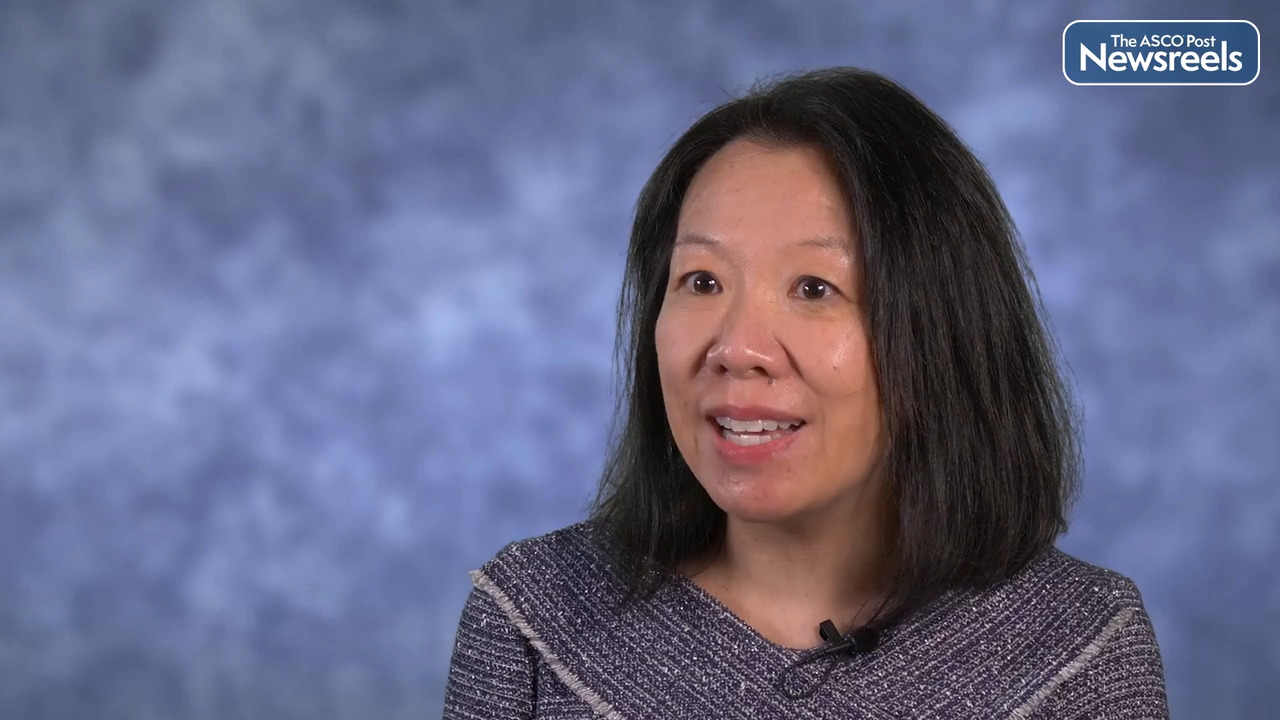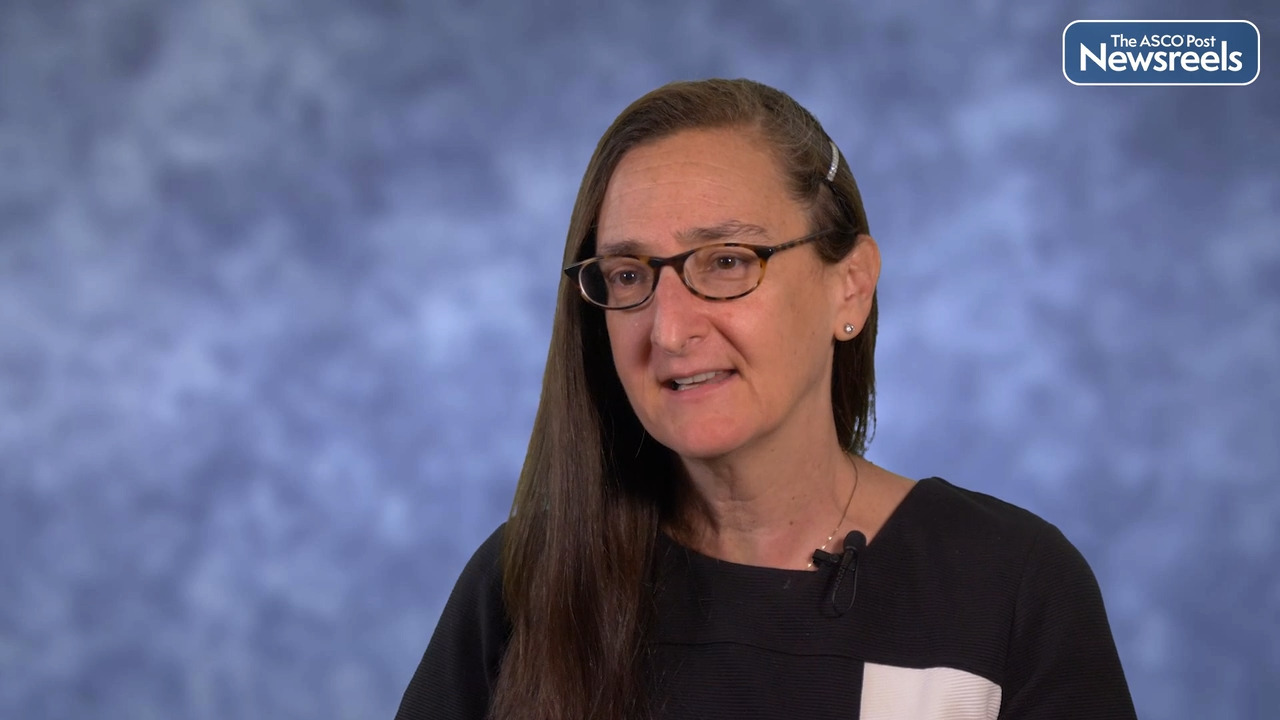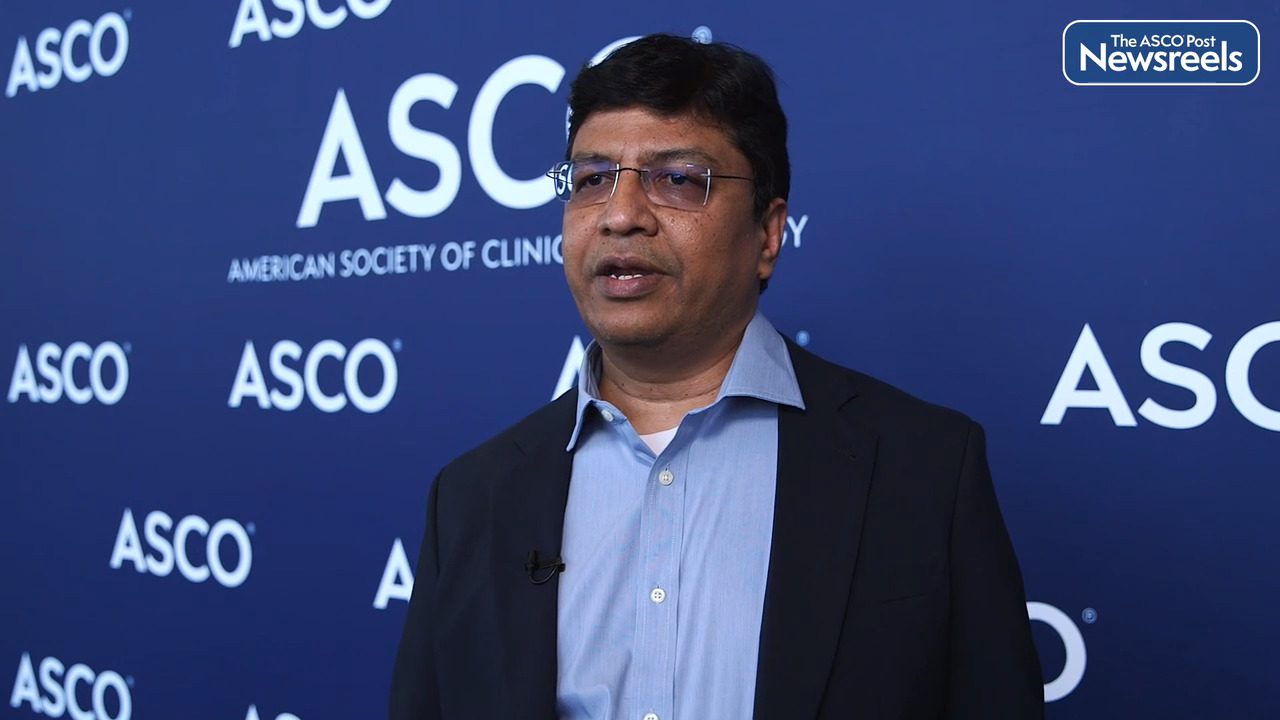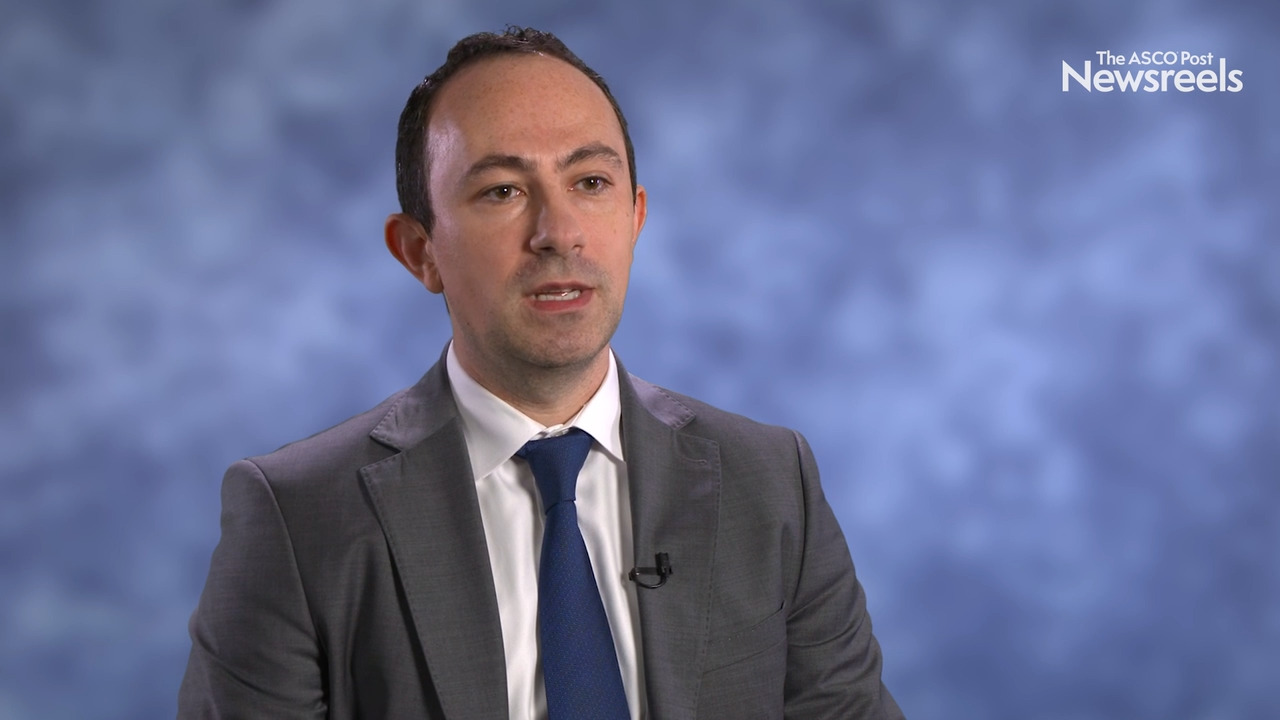Common Immune-Related Adverse Events: Spotlight on Gastrointestinal and Hepatic Toxicities
At the inaugural MD Anderson Clinical Education Symposium on Immunotherapy Organ Toxicity Management (IOTOX), a panel of experts discussed common immune-related adverse events associated with immune checkpoint inhibitor therapy, including gastrointestinal (GI), hepatic, dermatologic, pulmonary, and ...
Axatilimab for Refractory Chronic Graft-vs-Host Disease
In a phase I/II study reported in the Journal of Clinical Oncology, Carrie L. Kitko, MD, and colleagues found that axatilimab, an anti–colony-stimulating factor 1 receptor (CSF-1R) antibody, produced high response rates in patients who had undergone allogeneic hematopoietic cell transplantation and ...
Massage Therapy May Improve Symptom Burden for Pediatric Patients With Hematologic and/or Oncologic Conditions
A new study from University Hospitals (UH) Connor Whole Health found children, adolescents, and young adults with cancer or sickle cell disease treated at a pediatric academic medical center reported clinically significant reductions in pain, stress, and anxiety in response to massage therapy....
Study Compares the Cost and Efficacy of Anticoagulant Therapies
Research conducted by UC Davis Comprehensive Cancer Center and the University of Cincinnati showed that direct oral anticoagulants (DOACs) are more effective—and more cost-effective—than low–molecular-weight heparin for treating cancer-associated thrombosis. A study published by Gulati et al in...
Patient-Reported Outcomes Study Finds Severe Symptoms in Meaningful Minority of Patients With Cancer
Routine monitoring in the real world may help to identify patients with cancer who are experiencing challenging symptoms, without significantly disrupting clinical workload, according to data presented during the 2022 ASCO Quality Care Symposium.1,2 The analysis of nearly 40,000 patient-reported...
Does CBD Oil Improve Symptom Distress in Patients With Advanced Cancer Receiving Palliative Care?
In an Australian phase IIb trial (MedCan1-CBD) reported in the Journal of Clinical Oncology, Hardy et al found that use of cannabidiol (CBD) oil did not improve symptom distress vs placebo in adult patients with advanced cancer receiving palliative care. Study Details The double-blind multicenter...
Potential Factors in Oxaliplatin-Induced Peripheral Neuropathy in Patients With Stage III Colon Cancer
In an analysis from the phase III CALGB (Alliance)/SWOG 80702 trial of adjuvant FOLFOX (fluorouracil, leucovorin, and oxaliplatin) for patients with stage III colon cancer reported in the Journal of Clinical Oncology, Lee et al found that longer duration of oxaliplatin treatment was associated with ...
Effect of Geriatric Assessment Intervention on Patient-Reported Symptomatic Toxicity in Patients Aged 70 and Older Receiving Treatment for Advanced Cancer
In a secondary analysis of the Geriatric Assessment for Patients 70 Years and Older (GAP70+) trial reported in the Journal of Clinical Oncology, Eva Culakova, PhD, MS, and colleagues found that providing geriatric assessment–based recommendations to community oncologists was associated with reduced ...
Managing Primary Prophylactic Colony-Stimulating Factor Use in Patients Receiving Regimens Associated With Intermediate Risk for Febrile Neutropenia
In a study reported in the Journal of Clinical Oncology, Dawn L. Hershman, MD, MS, FASCO, and colleagues found that a standing order entry (SOE) for vs an alert against use of primary prophylactic colony-stimulating factor (PP-CSF) for patients receiving first-line regimens for cancer associated...
Incidence of Neurologic Side Effects From CAR-T Cell Therapy Is Higher in Patients With Hypophosphatemia, Study Finds
Patients with B-cell malignancies who had hypophosphatemia experienced a higher incidence and severity of neurologic side effects from chimeric antigen receptor (CAR) T-cell therapy, according to a study by Nowicki et al published in Cancer Immunology Research. The study results imply that...
Sandra L. Wong, MD, on Severe Symptom Reporting in Patients With Cancer Who Have Undergone Surgery
Sandra L. Wong, MD, of the Dartmouth-Hitchcock Medical Center, discusses her study findings showing that when patients with cancer who have had surgery reported severe symptoms via an electronic patient-reported outcomes questionnaire at six cancer centers, it appeared to be beneficial without overtaxing clinicians. There were few strong predictors of severe symptoms, which suggests population surveillance may be preferable to targeted surveillance (Abstract 243).
Ibrutinib for Pediatric Patients With Chronic Graft-vs-Host Disease
On August 24, 2022, ibrutinib was approved for pediatric patients 1 year of age or older with chronic graft-vs-host disease after failure of one or more lines of systemic therapy.1 A new oral suspension formulation is available. Supporting Efficacy Data Approval was based on findings from the...
Toxicity Outcomes With Stereotactic Ablative Radiotherapy for Patients With Up to Five Oligometastases
As reported in JAMA Oncology by Olson et al, the primary toxicity results of the phase II SABR-5 trial have shown a low rate of toxic effects with stereotactic ablative radiotherapy (SABR) for patients with up to five oligometastases. As stated by the investigators: “After the publication of the...
Dawn L. Hershman, MD, on Prophylactic Colony Stimulating Factors for Neutropenia: Improving Clinicians’ Prescribing Practices
Dawn L. Hershman, MD, of Columbia University College of Physicians and Surgeons, discusses findings that showed substantial variability in clinicians’ adherence to prescribing primary prophylactic colony stimulating factors in a pragmatic trial. Although the ability to opt out of the intervention is a feature of pragmatic trials, careful prestudy planning to estimate nonadherence is critical to ensure adequate power to detect an effect. Understanding reasons for intervention opt-outs may also inform future pragmatic studies aimed at improving adherence to practice guidelines.
FDA Approves Sodium Thiosulfate to Reduce the Risk of Ototoxicity Associated With Cisplatin
On September 20, the U.S. Food and Drug Administration (FDA) approved sodium thiosulfate (Pedmark) to reduce the risk of ototoxicity associated with cisplatin in pediatric patients aged 1 month and older with localized (nonmetastatic) solid tumors. Efficacy was evaluated in two multicenter,...
Association of Neurofilament Light Chain Levels With ICANS Risk After CAR T-Cell Therapy
In a retrospective study reported in JAMA Oncology, Butt et al found significantly higher pretreatment neurofilament light chain levels in patients who did vs did not develop immune effector cell–associated neurotoxicity syndrome (ICANS) after CD19 chimeric antigen receptor (CAR) T-cell therapy....
FDA Approves Eflapegrastim-xnst Injection for Chemotherapy-Induced Neutropenia
On September 9, the U.S. Food and Drug Administration (FDA) approved eflapegrastim-xnst injection (Rolvedon)—a long-acting granulocyte colony-stimulating factor (G-CSF) with a novel formulation—to decrease the incidence of infection, as manifested by febrile neutropenia, in adult patients with...
Postmarketing Colitis Cases May Be Associated With Alpelisib Use
In a research letter in JAMA Oncology, Sullivan et al described details of postmarketing cases of noninfectious colitis in patients with breast cancer reported to the U.S. Food and Drug Administration that were considered possibly or probably related to alpelisib treatment. Key Findings A total of...
Luspatercept for Anemia in Patients With Lower-Risk Myelodysplastic Syndromes: Long-Term Follow-up
In a long-term follow-up of the German phase II PACE-MDS trial reported in the Journal of Clinical Oncology, Uwe Platzbecker, MD, and colleagues described erythroid, neutrophil, and platelet hematologic improvement rates with luspatercept treatment for anemia in patients with lower-risk...
FDA Approves Ibrutinib for Pediatric Patients With Chronic Graft-vs-Host Disease
On August 24, the U.S. Food and Drug Administration (FDA) approved ibrutinib (Imbruvica) for pediatric patients aged at least 1 year with chronic graft-vs-host disease after failure of one or more lines of systemic therapy. Formulations include capsules, tablets, and oral suspension. iMAGINE Trial...
Postmarketing Ocular Toxicity in U.S. Adults Treated With Daratumumab
In an analysis reported in a research letter in JAMA Oncology, Nguyen et al identified postmarketing cases of ocular toxicity in patients receiving daratumumab in the United States. Daratumumab is a CD38-directed monoclonal antibody that was initially approved in 2015 for the treatment of multiple...
Momelotinib for Symptomatic and Anemic Patients With Myelofibrosis
Once-daily treatment with the oral JAK1/2 and ACVR1/ALK2 inhibitor momelotinib significantly improved outcomes of patients treated for myelofibrosis. Ruben Mesa, MD, FACP, and colleagues presented results of the MOMENTUM phase III randomized study, which evaluated momelotinib vs danazol in...
Incidence of Major Adverse Cardiac Events in Patients Receiving Immune Checkpoint Inhibitors
In a study presented at the 2022 ASCO Annual Meeting (Abstract 2508) and simultaneously reported in the Journal of Clinical Oncology, Naqash et al identified the incidence of major adverse cardiac events among patients receiving immune checkpoint inhibitors for cancer as captured in the serious...
Weekly Electronic Reporting of Symptoms Improved Outcomes in Patients With Advanced Cancer
People with advanced cancer who communicated their symptoms weekly using an electronic survey had about one-third better physical function and over a 15% better control of their symptoms compared to those who were evaluated less frequently via in-person clinical visits, according to findings from a ...
Sriram Yennu, MD, on Cancer-Related Fatigue: Is Open-Labeled Placebo an Effective Treatment?
Sriram Yennu, MD, of The University of Texas MD Anderson Cancer Center, discusses the placebo response in patients with advanced cancer and cancer-related fatigue. His latest findings show that open-labeled placebo was efficacious in reducing cancer-related fatigue and improving quality of life in fatigued patients with advanced cancer at the end of 1 week. The improvement in fatigue was maintained for 4 weeks (Abstract 12006).
Adverse Events Seen With Abiraterone or Enzalutamide Among Patients With Advanced Prostate Cancer
Men taking either of the two most common oral medications for advanced prostate cancer who had also undergone hormone therapy to treat their disease were at higher risk of serious metabolic or cardiovascular issues than patients who were receiving hormone therapy alone, according to findings...
Narsoplimab for Hematopoietic Stem Cell Transplantation–Associated Thrombotic Microangiopathy
In a pivotal phase II trial reported in the Journal of Clinical Oncology, Samer K. Khaled, MD, and colleagues found that narsoplimab, an inhibitor of mannan-binding lectin-associated serine protease-2, showed efficacy in the treatment of adult patients with hematopoietic stem cell...
AI Model May Help Predict Adverse Events From New Drug Combinations
Preliminary data from an artificial intelligence (AI) model could potentially predict side effects resulting from new combination therapies, according to results presented by Küçükosmanoğlu et al at the American Association for Cancer Research (AACR) Annual Meeting 2022 (Abstract 6312). “Clinicians ...
Concordance in Symptomatic Adverse Event Reporting by Children, Clinicians, and Caregivers
In a study reported in the Journal of Clinical Oncology, David R. Freyer, DO, MS, and colleagues found that clinicians consistently undergraded—and caregivers frequently overgraded—the severity of adverse events experienced by children with cancer. Study Details The study included 438...
Early Intrathecal Therapy for High-Grade ICANS in Patients Receiving CAR T-Cell Therapy
In a single-institution retrospective review reported in JAMA Oncology, Zurko et al found that early intrathecal therapy with hydrocortisone with or without intrathecal chemotherapy was effective in treating grade ≥ 3 immune effector cell–associated neurotoxicity syndrome (ICANS) in patients...
Web-Based Intervention to Manage Symptoms and Quality of Life in Women With Recurrent Ovarian Cancer
In an NRG Oncology/GOG study (GOG-0259) reported in the Journal of Clinical Oncology, Donovan et al found that both nurse-led (Nurse-WRITE) and self-directed (SD-WRITE) Web-based symptom self-management interventions (WRITE Symptoms) improved symptom control vs enhanced usual care alone in women...
Differences in Risk of Severe Adverse Events in Women vs Men Receiving Immunotherapy, Targeted Therapy, or Chemotherapy in Cancer Clinical Trials
In a study reported in the Journal of Clinical Oncology, Joseph M. Unger, PhD, and colleagues found that women in clinical trials of chemotherapy, immunotherapy, or targeted therapy had a significantly greater risk for severe adverse events overall—and, particularly, with immunotherapy. As stated...
Study Finds Direct Oral Anticoagulants Significantly Decrease Recurrent Venous Thrombosis for Adult Patients With Cancer
Direct oral anticoagulants should be considered the standard of care to treat adult patients with cancer-associated thrombosis, according to a new, ongoing study by Mayo Clinic researchers published by Riaz et al in Mayo Clinic Proceedings. The report examined the results of four randomized...
Does Armodafinil Improve Cancer-Related Fatigue in Patients With High-Grade Glioma?
In a phase III trial reported in JAMA Oncology, Porter et al found that armodafinil, a psychostimulant, did not improve cancer-related fatigue vs placebo in adult patients with high-grade glioma. As stated by the investigators, “Nearly 96% of patients with high-grade glioma report...
Study Examines Rates of Lymphedema in Black and White Patients With Breast Cancer
Black women had a 3.85-fold increased risk of developing lymphedema following treatment for breast cancer compared to White women, according to the results from a study by Barrio et al being presented at the 2021 San Antonio Breast Cancer Symposium (Abstract GS4-01). In addition, the researchers...
Fosnetupitant vs Fosaprepitant for Prevention of Chemotherapy-Induced Nausea and Vomiting
In a Japanese phase III noninferiority trial (CONSOLE) reported in the Journal of Clinical Oncology, Hata et al found that fosnetupitant was noninferior to fosaprepitant in preventing nausea and vomiting in patients receiving highly emetogenic chemotherapy (both in combination with palonosetron and ...
Digital Symptom Monitoring System May Improve Patients’ Symptom Control and Physical Function During Cancer Therapy
A digital symptom monitoring system in which patients undergoing cancer treatment could report symptoms through weekly at-home surveys resulted in better symptom control and physical function, as well as improved communication with their medical team, according to results from a study by Basch et...
Youssef Zeidan, MD, PhD, on HER2-Positive Breast Cancer: Treatment-Related Cardiotoxicity
Youssef Zeidan, MD, PhD, of Florida International University and the Lynn Cancer Institute, discusses the advances in radiotherapy planning and delivery that have reduced cardiac radiation exposure in patients with HER2-positive breast cancer who are treated with radiotherapy and trastuzumab (Abstract 12).
Ruxolitinib for Chronic Graft-vs-Host Disease After Failure of Systemic Therapy
On September 22, 2021, ruxolitinib, a tyrosine kinase inhibitor of JAK1 and JAK2 was granted approval for treatment of chronic graft-vs-host disease after failure of one or two lines of systemic therapy in adult and pediatric patients aged ≥ 12 years.1 Supporting Efficacy Data Approval was...
Pharmacovigilance Study of Pancytopenia in Patients Receiving PARP Inhibitors
In a study reported in a research letter in JAMA Oncology, Morice et al found that pancytopenia was associated with use of poly (ADP-ribose) polymerase (PARP) inhibitors for cancer treatment, according to drug adverse event reports in the World Health Organization global pharmacovigilance database...
Effect of Geriatric Assessment–Driven Intervention on Incidence of Severe Chemotherapy-Related Toxicity in Older Patients With Cancer
In a single-center study reported in JAMA Oncology, Daneng Li, MD, and colleagues found that a geriatric assessment–driven intervention (GAIN) was associated with a reduced incidence of grade ≥ 3 adverse events and a higher frequency of completion of advance directives vs standard of care among...
Ruxolitinib Granted FDA Approval for Chronic Graft-vs-Host Disease
On September 22, the U.S. Food and Drug Administration approved ruxolitinib (Jakafi), a JAK inhibitor, for the treatment of chronic graft-vs-host disease (GVHD) after failure of one or two lines of systemic therapy in adult and pediatric patients aged 12 years and older. REACH3 Efficacy was...
Technology-Enabled Monitoring of Adverse Reactions to Immune Checkpoint Inhibitors
In an interim analysis of a single-institution study reported in JAMA Network Open, Pavlos Msaouel, MD, PhD, and colleagues found that the use of a mobile device application for patient reporting of adverse reactions to immune checkpoint inhibition was feasible. It permitted identification of...
Pharmacologic Cardioprotection in Women With Nonmetastatic Breast Cancer Receiving Anthracycline-Based Chemotherapy
In an interim analysis of the Italian phase III SAFE trial reported in JAMA Oncology, Livi et al found that a cardioprotective strategy using ramipril and/or bisoprolol reduced the risk of myocardial dysfunction in women with nonmetastatic breast cancer receiving anthracycline-based chemotherapy....
Belumosudil for Chronic Graft-vs-Host Disease
On July 16, 2021, belumosudil, an inhibitor of Rho-associated coiled-coil kinase 2, was approved for the treatment of adult and pediatric patients 12 years and older with chronic graft-vs-host disease after the failure of at least two prior lines of systemic therapy.1 Supporting Efficacy Data...
FDA Pipeline: Reviews for Agents in Acute Graft-vs-Host Disease, Nasopharyngeal and Ovarian Cancers
Recently, the U.S. Food and Drug Administration (FDA) granted Priority Review to an agent for the prevention of acute graft-vs-host disease; Breakthrough Therapy designation to an anti–PD-1 monoclonal antibody for the treatment of metastatic nasopharyngeal carcinoma; and Fast Track designation to a ...
Wearable Temperature Sensor May Aid in Detecting Febrile Adverse Events in Patients With Cancer
A simple, wearable temperature sensor was able to detect dangerous complications in hospitalized patients with cancer hours earlier than routine monitoring. The device, which takes readings every 2 minutes and wirelessly transmits them to the cloud, was able to quickly detect adverse events that...
Ruxolitinib for Glucocorticoid-Refractory or -Dependent Chronic Graft-vs-Host Disease After Allogeneic Stem Cell Transplantation
In the phase III REACH3 trial, reported in The New England Journal of Medicine, Robert Zeiser, MD, and colleagues found that ruxolitinib produced a significantly higher overall response rate vs investigator-selected control treatments in patients with glucocorticoid-refractory or -dependent chronic ...
Survivors of Early-Stage Breast Cancer Face Broad Range of Symptoms and Concerns
Patients with early-stage breast cancer may be at low risk of dying of their disease, but they experience a high burden of physical and psychological symptoms long after their treatment has ended, according to data presented during the 2021 American Society of Breast Surgeons Annual Meeting.1...
Study Examines Aromatase Inhibitor–Associated Musculoskeletal Symptoms in a Diverse Population With Early Breast Cancer
A clinical trial in a racially diverse group of postmenopausal women with early breast cancer to study severe pain in the bones, muscles, ligaments, tendons, and nerves caused by aromatase inhibitor treatment has found that the symptoms were more commonly reported in Black and Asian patients than...




